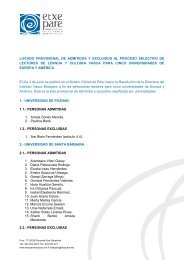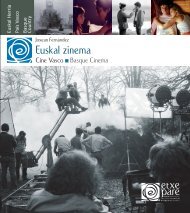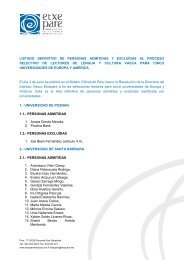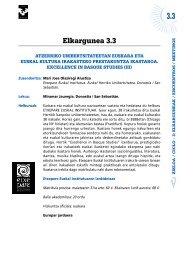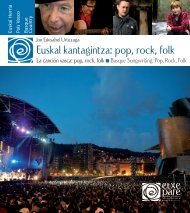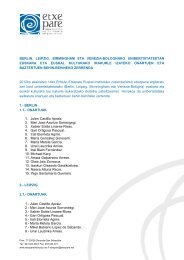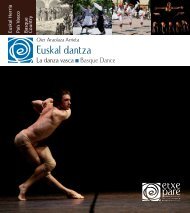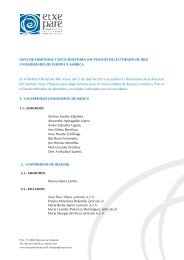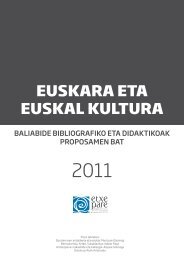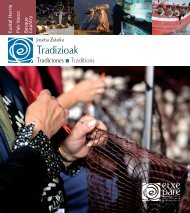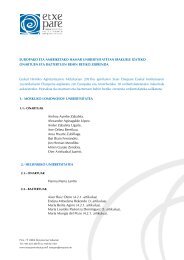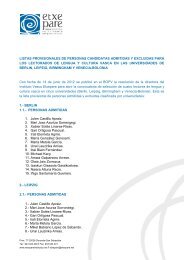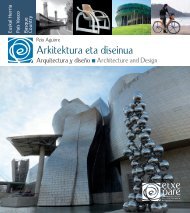XX. mendeko euskal literatura - Etxepare, Euskal Institutua
XX. mendeko euskal literatura - Etxepare, Euskal Institutua
XX. mendeko euskal literatura - Etxepare, Euskal Institutua
Create successful ePaper yourself
Turn your PDF publications into a flip-book with our unique Google optimized e-Paper software.
eplantea el rol que cada género juega dentro del<br />
nacionalismo vasco. En 2010 Urretabizkaia publicó 3<br />
Mariak. Una vez más la autora analiza el rol de las<br />
mujeres en la sociedad vasca, pero en esta ocasión lo<br />
hace desde el punto de vista de la vejez.<br />
Ofrecer una mirada crítica sobre el nacionalismo<br />
vasco, tanto el tradicional como el radical, es el eje<br />
de muchas de las obras de Itxaro Borda (1959). Su<br />
primera novela, Basilika (1984), sentó las bases de<br />
su escritura, una escritura que huye de todo barroquismo<br />
estilístico y formal y que rompe con las leyes<br />
morales y creencias de la sociedad vasca católica del<br />
continente. De todas maneras, la obra más significativa<br />
de Borda es la tetralogía que cuenta como protagonista<br />
a la detective Amaia Ezpeldoi, compuesta por<br />
los títulos Bakean ützi arte (1984), Bizi nizano munduan<br />
(1996), Amorezko pena baño (1996) y Jalgi hadi<br />
plazara (2007). Valiéndose de las técnicas de la novela<br />
negra, Borda analiza los puntos conflictivos clave<br />
en la sociedad vasca (la situación política, el euskera,<br />
la insumisión, la industrialización, el rol de la mujer).<br />
Así mismo, al igual que otras escritoras (Walton &<br />
Jones 1999), Borda replantea el denominado “hard<br />
boiled detective” característico de la novela negra<br />
impulsada por Chandler y Hammett: la detective<br />
Amaia Ezpeldoi es emocional, patriota y lesbiana,<br />
además de ser una admiradora de Lenin. El compromiso<br />
feminista y cultural de Borda tuvo continuidad<br />
en el libro %100 Basque (2001), ganador del Premio<br />
Euskadi de Literatura. En sus más recientes obras, las<br />
novelas Zeruetako erresuma (2005) y Ezer gabe hobe<br />
(2009), la autora analiza los acontecimientos de las<br />
ultimas décadas.<br />
La situación política vasca y el rol que las mujeres<br />
juegan en la misma son la base de las obras de Laura<br />
Mintegi (1955). Su primera novela, Bai... baina ez<br />
(1986), contrarrelato del Haur besoetakoa de Jon<br />
Mirande, es una historia de amor situada fuera de<br />
las normas sociales. Su siguiente obra, Legez kanpo<br />
(1991), sigue las técnicas de la novela negra para<br />
2008). This work is organised on two levels: the first<br />
focuses on a letter which the protagonist, Ama (the<br />
name appears in block capitals in the text) writes to<br />
her children in a red notebook. Since their father<br />
took them with him seven years ago, the woman has<br />
had no news of them at all. The second level focuses<br />
on a trip to Venezuela by a female lawyer hired by<br />
the mother to hand the notebook to her children.<br />
Koaderno gorria addresses the relationship between<br />
maternity and nation or, to be more precise, the difficulty<br />
of combining political activism with maternity.<br />
The novel reconsiders the role that each generation<br />
plays within Basque nationalism. In 2010 Urretabizkaia<br />
published 3 Mariak. Here, once again, the<br />
author analyses the role of women in Basque society,<br />
but on this occasion from the perspective of old<br />
age.<br />
A critical perspective of Basque nationalism, whether<br />
traditional or radical, is the focus of many works by<br />
Itxaro Borda (1959). Her first novel, Basilika (1984),<br />
shaped the foundations of her writing, a writing that<br />
flees any form of stylistic or formal baroque styles,<br />
and which challenges the moral codes and beliefs of<br />
continental Catholic Basque society. In any event,<br />
Borda’s most significant work is the tetralogy whose<br />
main protagonist is the detective Amaia Ezpeldoi:<br />
Bakean ützi arte (1984), Bizi nizano munduan (1996),<br />
Amorezko pena baño (1996) and Jalgi hadi plazara<br />
(2007). Employing the techniques of detective fiction,<br />
Borda explores the key conflictive points in Basque<br />
society (the political situation, Euskara, refusal<br />
to do military service, industrialisation, women’s roles,<br />
and so on). Likewise, in the same way as other<br />
authors (Walton and Jones 1999), Borda reconsiders<br />
the so-called hard-boiled detective characteristic of<br />
the detective fiction created by Chandler and Hammett:<br />
the detective Amaia Ezpeldoi is emotional, a<br />
patriot and a lesbian, as well as being an admirer of<br />
Lenin. Borda’s feminist and cultural engagement continued<br />
in the book %100 Basque (2001), which won<br />
39



